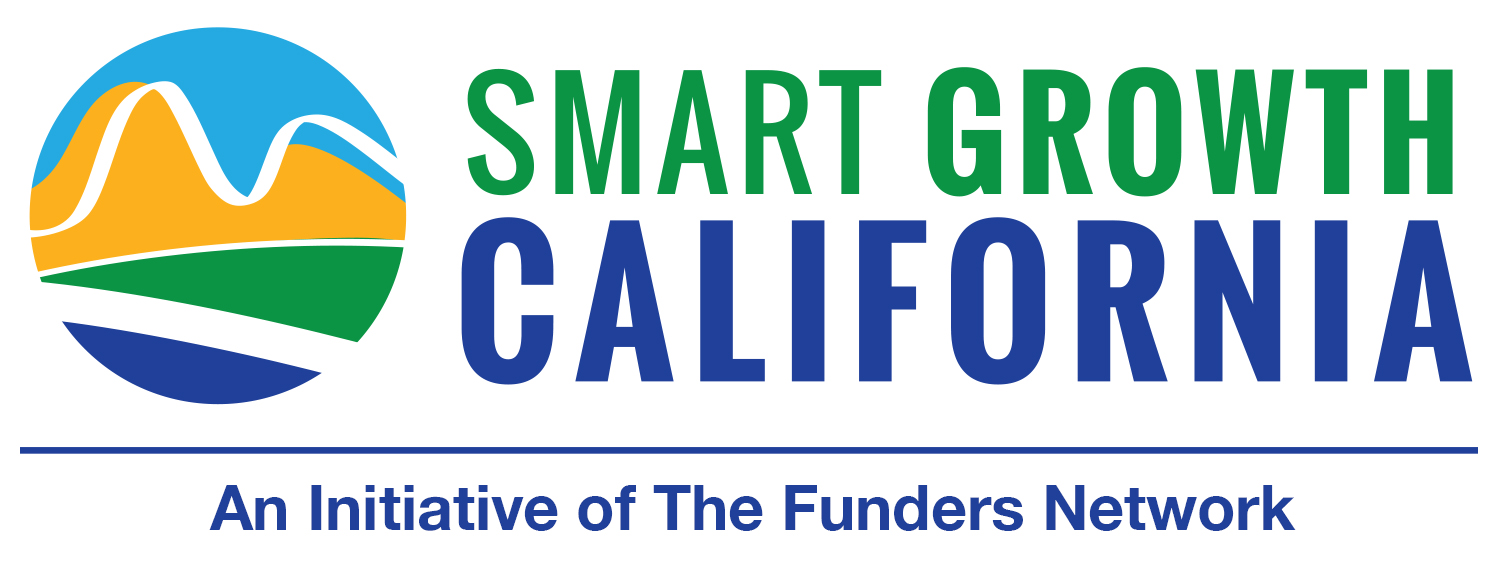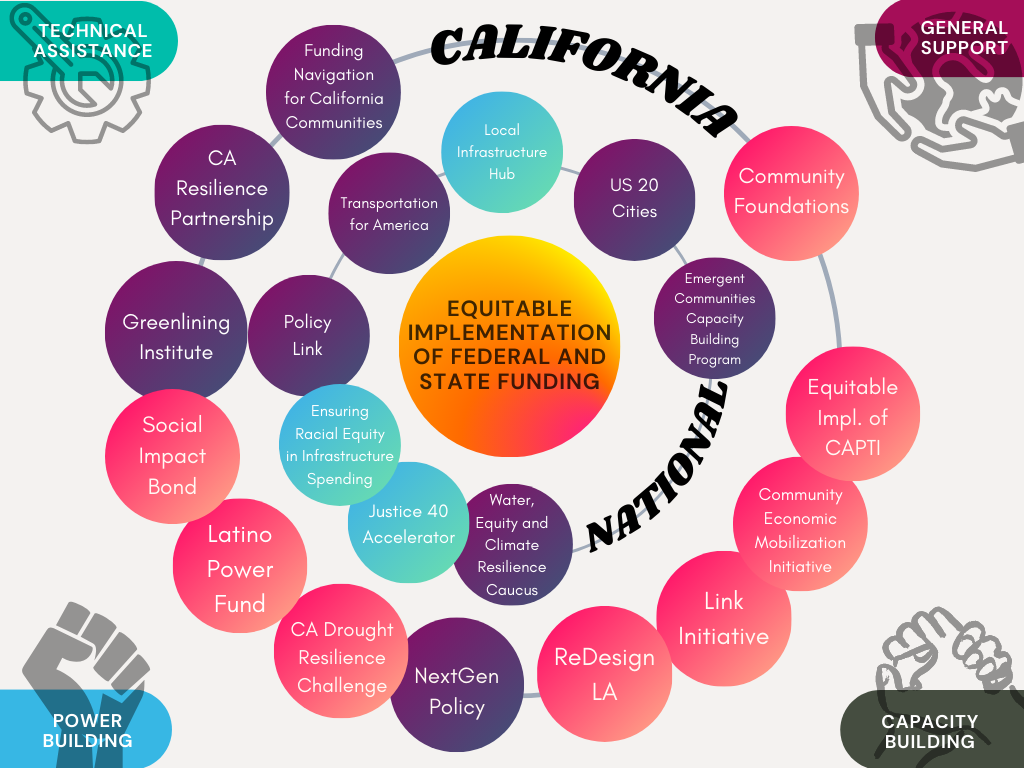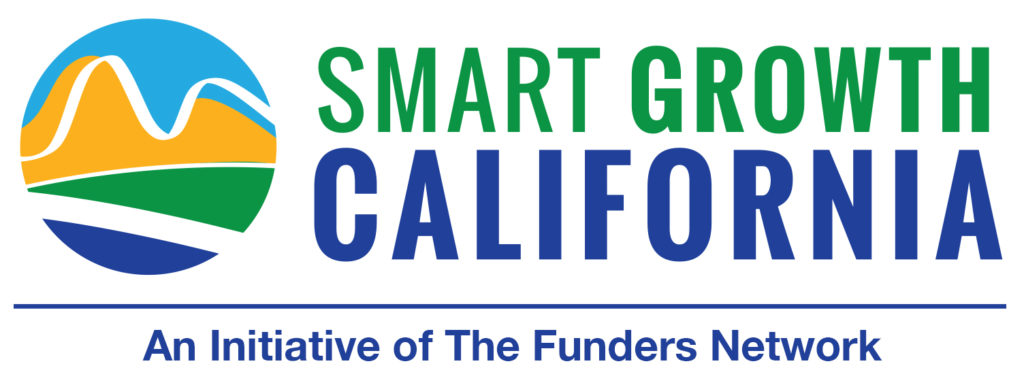Funders active in Smart Growth California workgroups have discussed the unique role that philanthropy can play in supporting the equitable implementation of federal and state funding streams. This is in light of funding from COVID recovery bills, the federal infrastructure package, and the state surplus that has begun flowing into communities since mid-2020. There is more money “on the table” for equitable smart growth than in decades, and yet history has shown that simply having resources is not enough to ensure it gets to where it is needed most.
There is significant opportunity for philanthropy to support efforts to shape the impact of these dollars. Some funders are providing technical assistance and general operating support to frontline and community-based organizations in order to shape community-driven applications and, in some cases, secure government contracts themselves. Others are directly supporting small and disadvantaged municipalities with the support they need to compete for funding, as so often the communities that need it most are least equipped to pursue and secure the dollars. Ongoing support continues to flow to those who advocate shaping the criteria that determine the flow of money in a way that keeps officials accountable for equitable implementation.
I’m pleased to report that numerous funders in our network have launched various initiatives that leverage this moment of significant public funding to support healthy, equitable and resilient communities — many of which are open to additional philanthropic support.
If you’re aware of any other initiatives that funders are collaborating together on in support of equitable implementation of federal and/or state funding, please contact Ron Milam at Smart Growth California.
CALIFORNIA-FOCUSED PHILANTHROPIC INITIATIVES
Initiative: Community Economic Mobilization Initiative (CEMI)
Foundations: The Center at Sierra Health Foundation in partnership with Sierra Health Foundation and The James Irvine Foundation
Description: Aims to build community-based organizations’ capacity to access and impact the direction of public funds for inclusive economic development and climate change. This includes the unprecedented level of financial investments for economic development from the federal American Rescue Plan and Infrastructure Investments and Jobs Act and the state’s Community Economic Resilience Fund (CERF) and budget surplus.
For more info, check out this Inside Philanthropy article.
Amount: $15 million
Initiative: Latino Power Fund
Foundation: The Latino Community Foundation
Description: Initiative to support California Latino-led grassroot organizations in the frontlines of power building. The Latino Power Fund will be the impetus for a just, equitable California where Latino-led grassroot organizations have the resources needed to achieve the political and civic wins our state requires for a representative democracy and an inclusive economy. The goals of the fund are to strengthen organizations engaged in movement building and healing; mobilize Latino leaders and voters to drive lasting civic and political change; and uplift a narrative and agenda that is progressive, just, and rooted in equity.
Amount: $50 Million
Initiative: Social Impact Bond
Foundation: The California Endowment
Description: “Intended to support the power building ecosystem in California: the infrastructure and institutional support for the hundreds of nonprofits across California that fight day-in and day-out for systems and policy change.” Funding will build capacity for organizations to apply and secure federal and state funding in support of healthy, inclusive communities.
Amount: $300 million
Initiative: Equitable Implementation of The Climate Action Plan for Transportation Infrastructure (CAPTI)
Foundation: Resources Legacy Fund
Description: Supporting the equitable implementation of The Climate Action Plan for Transportation Infrastructure (CAPTI) in CA. The CAPTI Framework was approved by state transportation agencies to align over $5 million in transportation each year, with the state’s climate and equity goals. With transportation at 40% of the emissions and disproportionate burdens on vulnerable communities, RLF will support CBOs to engage in the decisions that can institutionalize CAPTI, as well as provide technical assistance and support for collaboration.
Amount: Over $5 million
Initiative: The Link Advocates, Governments, Families, and Parks Initiative
Foundations: First 5 LA, with Resources Legacy Fund, The Rosalinde and Arthur Gilbert Foundation, and The California Wellness Foundation
Description: “supports community-led organizations in building civic and planning capacity to access funding for parks and other forms of public infrastructure in a way that addresses the priorities of residents and families in the communities where it’s needed the most.”
Amount: $15 million
Initiative: ReDesign LA
Foundation(s): The Water Foundation and Accelerate Resilience Los Angeles (ARLA)
Description: Provides technical assistance and building the capacity of small municipalities, school districts, and local CBOs to develop and implement multi-benefit projects that integrate stormwater capture and climate resiliency.
Community Foundations across the state are also working to develop local partnerships to help secure federal funding, including The San Francisco Foundation, California Community Foundation, San Diego Foundation, Silicon Valley Community Foundation, Central Valley Community Foundation, Humboldt Area Foundation, Tahoe Truckee Community Foundation, and the Imperial Valley Community Foundation.
NATIONAL PHILANTHROPIC INITIATIVES
Smart Growth California is an initiative of The Funders Network, a national philanthropic network. Below are some national initiatives that we hope will also fund work in California.
Initiative: Ensuring Racial Equity in Infrastructure Spending at #TFN2022 and is creating and supporting connections and relationships between philanthropy, community, and the federal government.
Foundation: Communities First Fund
Description: Key need assessment takeaways from the conversation: 1. Access to flexible and unrestricted funds for frontline communities; 2. Elevate community-led “shovel-worthy” projects and demonstrate good practice; and, 3. Support technical and capacity assistance that prioritizes accountability to frontline communities, In response, Communities First launched with partners the Communities First Infrastructure Alliance (CIFA). CFIA is “an entity committed to the equitable implementation of IIJA, centering the needs of community-led partners, projects, and plans. The Alliance will bring together leaders in government, philanthropy, and investment, committed to bringing resources to communities in ways that support community plans, solutions, priorities, needs, and visions for a thriving future.”
For more information, listen to this Streetsblog Talking Headways Podcast interview with Helen Chin.
Initiative: Water Solutions Fund
Foundation: The Water Foundation with the Governor’s office
Description: The Water Solutions Fund responds to this call by pooling and aligning philanthropic resources and working with the field to ensure that the implementation of the Bipartisan Infrastructure Law realizes its full promise by focusing on policy, projects, and power.
Initiative: Local Infrastructure Hub
Foundation: Bloomberg Philanthropies, Emerson Collective, the Ford Foundation and the Kresge Foundation
Description: The Hub is “a national program to ensure that all cities and towns can access federal infrastructure funding to drive local recovery, improve communities, and deliver results for residents…brings together leading policy and innovation experts into a program that includes information, resources, and technical assistance to help cities and towns of all sizes and from all regions to access this once-in-a-lifetime funding opportunity.”
Organization: What Works Plus (WW+) Collaborative
Description: WW+ was formed to maximize the Bipartisan Infrastructure Law’s (BIL) once-in-a-generation investment in America’s infrastructure. WW+ serves as a partnership coordination hub across philanthropy, non-profits, and different levels of government to advance equity and climate resilience through thoughtful implementation of BIL funding. They focus on partnerships across water, energy, broadband and transportation sectors that result in better outcomes for communities, workers, and entrepreneurs.
View Current Funding Opportunities
Initiative: Justice 40 Accelerator
Description: The Justice40 Accelerator will share information, resources, and capacity with frontline community organizations. These communities will be able to formulate projects and successfully apply to the Federal funding opportunities.
Initiative: 2022 Mosaic Movement Infrastructure RFP
Organization: Mosaic Momentum
Description: This year, Mosaic will distribute $5.5M to build local to national movement infrastructure that enhances diverse and collaborative engagement on four major policies and efforts intersecting with the environmental and justice communities – the Inflation Reduction Act, Bipartisan Infrastructure Law, Justice40, and 30×30. Their goal is to move resources quickly to maximize the climate, environmental, and community benefits now possible, and ensure no community bears disproportionate burdens as this effort unfolds.
NONPROFIT-LED INITIATIVES
California Focus
Initiative: 10,000 Communities Initiative
Organization: The Milken Institute
Description: The Milken Institute announced it will create a California-specific grant matchmaking platform to connect climate infrastructure projects to funding opportunities and technical assistance through its Community Infrastructure Center. This California matchmaking portal will help fill in funding and capacity gaps that frontline communities face in working to achieve climate resilience. Communities can register their projects now at 10kcommunies.org.
Amount: $10 million
Initiative/Organization: Greenlining Institute
Foundation: Bezos Fund
Description: “to help communities of color most burdened by climate change and systemic discrimination forge the infrastructure needed to fight climate change and build healthier, more resilient communities… Over two thirds of this new grant will be designated specifically for local grassroots organizations in these communities, building infrastructure and connecting them with the technical expertise needed to develop climate resilience projects.” More information here.
Amount: $10 million
Initiative: Greenlining the Block
Organization: Greenlining Institute (GLI)
Description: GLI is launching a new initiative to support the leadership and expertise of communities of color to prepare for and maximize federal, state and local infrastructure investments to drive climate action that meets their needs. In the first round, they will provide capacity-building funding, technical assistance, and peer-to-peer learning to 9 incredible community-based organizations across California, Colorado, Illinois, Virginia, North Carolina, and Michigan.
Initiative: California Resilience Partnership, Project Preparation Program
Organization: Resilient Cities Catalyst
Foundation: Hilton Foundation (provided seed funding)
Description: Currently raising additional funds toward a $10M, 3-year Project Preparation Program, which includes support from the Hilton Foundation “developing a pipeline of 20 equity- and resilience-building ‘shovel worthy’ projects in historically marginalized communities across the state eligible for and ready to capitalize upon unprecedented levels of federal and state funding.”
Amount: $10 million
Initiative: Climate 100
Organization: NextGen Policy
Description: Calls on California’s leaders to “Put 100 percent of our taxpayer dollars to work in a manner that is consistent with our state’s climate goals, Enact and build on the Governor’s 2022-2023 $37B Climate Budget, Develop a $100B 3-year transformative climate investment package for 2023.”
Initiative: Funding Navigation for California Communities
Organization: CivicWell, with support from The California Endowment & Resources Legacy Fund
Description: Technical assistance for communities to pursue funding streams
NONPROFIT-LED INITIATIVES
National Focus
Initiative: Pilot Program Place-Based Investment
Organization: Dream.Org
Description: Dream.Org is launching a pilot program to empower frontline communities to unlock historic amounts of climate funding from the Inflation Reduction Act to ensure that communities most impacted by climate change are the first to benefit from these funds. Based on SGC’s Transformative Climate Communities Program, this pilot will leverage public-private partnerships to direct climate investments to communities that need them most, emulating SGC’s Centering Communities in Place-Based Investment model. Dream.Org will be working with 10 cities and communities across the U.S. including Fresno, Detroit, Savannah, Denver, and others beginning in April 2023.
Initiative: Infrastructure Justice campaign
Organization: PolicyLink
Description: Launched a new Infrastructure Justice campaign “to ensure policies, practices, and investments govern for racial equity, repair the harm of past policies, and promote transformative outcomes.”
Initiative: Infrastructure Law Virtual Guide
Organization: Transportation for America
Description: Transportation for America developed a virtual guide that has information for communities to get the most out of the infrastructure law. Also published a topical deep dive into this historical piece of legislation: how the bill can improve (or exacerbate) inequities.
Initiative: Emergent Communities Capacity Building (ECCB) Program
Organization: Emerald Cities Collaborative
Description: Emerald Cities Collaborative launched their Energy Democracy Emergent Communities Capacity Building (ECCB) Program, which will provide training, technical assistance, and grant funding for community-based organizations to design and implement a local energy democracy/energy justice policy agenda.
Organization/Initiative: Water, Equity and Climate Resilience Caucus
Description: Water, Equity and Climate Resilience Caucus, a national network of organizations working to address water equity and climate resilience – centering frontline communities of color and low-income communities.
GOVERNMENT-LED INITIATIVES
Initiative: Bipartisan Infrastructure Law Technical Assistance Guide
Agency: The White House
Description: “to help state, local, Tribal and territorial governments navigate, access, and deploy infrastructure resources that will build a better America. The Biden Administration has identified over $700 million in dedicated funding across more than 65 technical assistance programs…has engaged with a range of external stakeholders including, philanthropic, labor and nonprofit organizations, to highlight available nongovernmental resources and create a pipeline to assist communities in quickly and equitably accessing and deploying federal infrastructure funding.
Amount: over $700 million
Initiative: Environmental Justice Collaborative Problem-Solving (EJCPS) Cooperative-Agreement Program
Agency: United States Environmental Protection Agency (EPA)
Description: The EJCPS Cooperative Agreement Program is a new EPA program that will provide financial assistance to community-based nonprofit organizations working to address local environmental or public health issues in their communities. The program assists recipients in building collaborative partnerships with other stakeholders (e.g., local businesses and industry, local government, medical service providers, academia, etc.) to develop solutions to environmental or public health issue(s) at the community level.
Initiative: DOT Navigator
Agency: US Department of Transportation
Description: The DOT Navigator is a new resource to help communities understand the best ways to apply for grants, and to plan for and deliver transformative infrastructure projects and services.
If you’re aware of any other initiatives that funders are collaborating together on in support of equitable implementation of federal and/or state funding, please contact Ron Milam at Smart Growth California.


